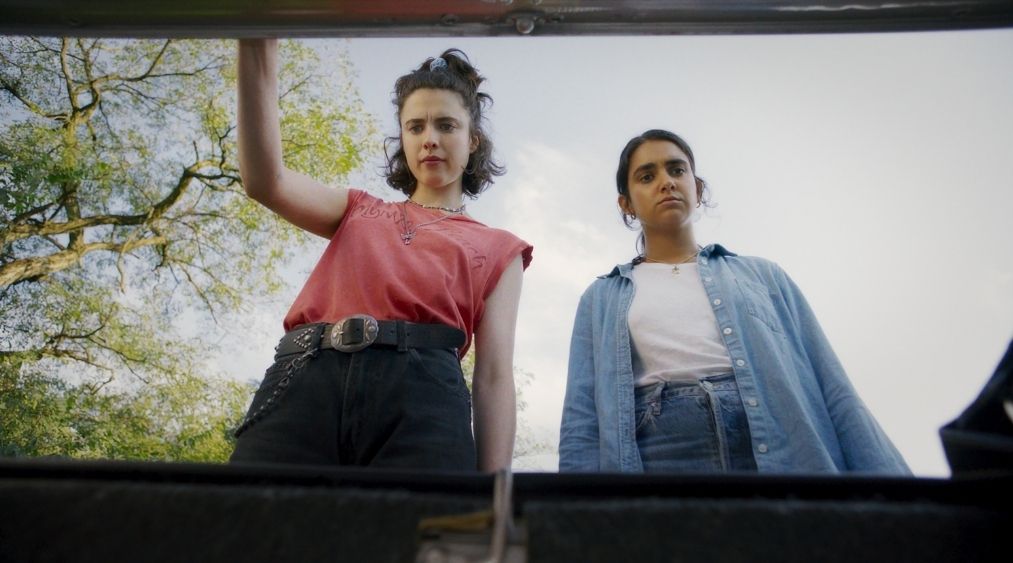With his first solo directorial effort, Ethan Coen vibrantly cements himself as the funny Coen brother. His wildly offbeat, almost psychedelic Drive-Away Dolls is a road-tripping odyssey through America’s bizarre straits, but it’s also one that foregoes any sense of gravity. Where previous efforts, alongside his creative partner Joel, married the absurd with a cruel air of drama, Drive Away Dolls cements itself as pure farce—an aggressively unserious caper about two lesbians journeying down south while they unknowingly carry a very revealing briefcase.
Where Joel brought a solemn edge to each of their varied projects, Ethan imbued them with a palpable levity. It’s why much of Drive-Away Dolls manifests as an airy analog to No Country For Old Men or even O Brother, Where Art Thou. But in disregarding a satisfying balance between lighter and heavier moments, Ethan’s solo venture becomes cartoonish to a fault, lacking the necessary weight to make its bonkers yet heartfelt odyssey of self-discovery memorable. While Drive-Away Dolls isn’t aiming for prestige, its campy, intoxicating road trip never becomes the biting satire of American culture it aims to be. Nonetheless, it remains an irreverent journey worth taking.
The story, co-penned by Coen and Tricia Cooke, follows two lesbians with wildly disparate personalities in 1999. Jamie (Margaret Qualley) is an impetuous, sexually promiscuous free spirit whose cop girlfriend (Beanie Feldstein) just broke up with her. Meanwhile, her taciturn friend Marian (Geraldine Viswanathan) desperately needs to break out of her shell. In dire need of a fresh start, the two embark on an impromptu road trip to Tallahassee. However, they quickly find themselves embroiled in the seedy underbelly of the American South. They’re unwittingly pursued by a trio of inept criminals (Colman Domingo, Joey Slotnick, and C.J Wilson) in search of an incredibly damaging suitcase.
Though it runs at a brisk 83 minutes, each scene is tightly packed with Coen’s trademark linguistic depth. The immensely lived-in cast of characters arm themselves with a gaggle of notable one-liners and lewd similes, each piercing the screen with reckless abandon. With layered refrains like “love is a sleigh ride to hell” and oddly lyrical retorts like “It’s like rubbing day-old spaghetti across my tits,” Coen brings each raucous character to life.
Despite how quickly Drive-Away Dolls moves on to the next beat, it never sacrifices its ability to revel in the minutiae of its characters. They’re immersed in wonderfully jabbing and dextrous rapport. Through each verbal clash, quiet moment of comfort, and deliriously odd encounter, Coen conjures an ebb and flow that is both hypnotic and electric. As if the film is unafraid to vividly dance to its erratic beat.

The textured performances play a key role in achieving that mesmerizing flow. Qualley captures a new form of southern belle, radiating an aura that’s as scintillating as it is rash. Her eyes are sharp and her fast-talking mouth single-handedly fuels the film’s breakneck momentum. Yet, for as adventurous as her character is, Qualley never forgets to lend her a distinct tenderness. She perfectly plays off her demure partner-in-crime. Viswanathan brings range to a character defined by her closed-off demeanour, finding subtlety in a film that vehemently avoids it. Slotnick and Wilson are also highlights as bickering, pontificating henchmen. They almost steal the central duo’s limelight. Pedro Pascal and Matt Damon also make notable impressions despite their very limited screen time.
Yet, for all Drive-Away Dolls has going for it, there’s an inherent frivolity it struggles to shake. Especially as it writes itself into corners that ultimately resolve themselves. While its slapdash approach to the crime caper is full of outlandish highlights, it is also forced to sacrifice the arcs of individual characters—something crucial to its strange, impassioned take on self-discovery and queerness. In struggling to balance levity and gravity, the true impact of its madcap satire is blunted.
These shortcomings are only exacerbated by some clunkily incorporated psychedelia and cartoony editing flourishes. The most distracting of which include a revolving door-like transition and even more confusingly, an anvil sound effect. While Drive-Away Dolls is clearly channelling the crass, farcical spirit of 70s sexploitation cinema—with Coen labeling it the first of a planned Queer B-movie trilogy—it becomes too breezy of a watch at times. It never fully digs into the depths of its weirdness. The result is an experience that has a lot to say, but none of the right words to fully do them justice.
Despite failing to retain the staying power of Coen’s earlier efforts, Drive-Away Dolls is so ludicrous and spirited that it’s not hard to find something to love along its unmoored journey. Its deeply odd, sex-fuelled odyssey survives as a perfect distillation of the humour and heart Ethan Coen brought to his now-legendary cinematic partnership. While it may lack the same dramatic, darkly comic disposition it’s a welcome entry to a catalogue that has never been afraid to reinvent itself.
Drive-Away Dolls is available now on VOD.
Drive-Away Dolls
-
Rating - 7/107/10
TL;DR
Despite failing to retain the staying power of Coen’s earlier efforts, Drive-Away Dolls is so ludicrous and spirited that it’s not hard to find something to love along its unmoored journey.







